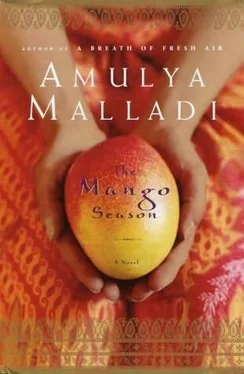“Are they planning to have children?” I asked the natural question.
Anand and Neelima had been married for over a year now and by all Indian standards they should at least be pregnant. It always boggled me, the lack of contraception and planned parenthood. Most of the married couples I knew from India had a child within a year of their wedding, which meant that they never thought about contraception. Most Indian couples wouldn’t dream of having sex without the benefit of a nice, five-day marriage celebration. Some of my Indian friends were adamantly staying childless, but the pressure from their families was pushing them into having unprotected sex with their spouse.
Sowmya held the steel saucepan in which the milk had been boiling with a pair of steel tongs. The milk looked frothy and I wrinkled my nose at the familiar smell of slightly burned milk. As the milk sizzled into the cups, Sowmya clicked her tongue sadly. “Neelima says that they have been trying, but no baby yet.”
“It’s just been a year,” I said. “You like her.”
“She is nice to me,” Sowmya replied casually. “She is a good girl. She helps me whenever she comes home. Amma never cooks and Nanna… well, he doesn’t like to cook… and why should he when I am here?”
My grandmother was a strange creature. She came from a generation where women were treated like doormats, yet she had managed to stay out of the kitchen for most of her life. Earlier in her marriage her mother-in-law did all the cooking, and by the time she passed away my mother had been old enough to do the cooking. During the times my mother couldn’t cook, my grandfather wielded the spatula.
There was a ritual in most Brahmin families, even now in some, during which women who are having their period had to “sit out.” “Sitting out” literally means they are relegated to one room at the end of the house-the room next to the veranda in my grandparents’ house-and are not allowed to touch anyone or anything during their “contaminated” period. When I was young I would always want to touch the women who were sitting out. I didn’t know what “sitting out” meant and I would try to get away with touching the women. Once it was my grandmother and I ended up being doused with a bucketful of water from the well to cleanse me. Needless to say, after that I never had the desire to touch any woman who sat out.
When the women sit out, the men have to cook, and that was how my grandfather and most Brahmin men learned how to cook.
Now, when Sowmya has her period, my mother comes and cooks or Lata does it. After all, it was not right for the man of the house to spend any time in the kitchen when he had grown daughters.
I wondered if Ammamma knew how to cook-she must, I rationalized. Her parents would never have permitted her not to learn. I wondered why Ma never encouraged me to cook. She was always trying to get me out of the kitchen: “You will mess everything up and then I will have to clean it. Just stay out of here and let me deal with my headache… I don’t need any help.”
I learned to cook a few dishes but all in all there was no way I could cook a meal for several people the way Sowmya or Ma could.
When I used to complain to Nanna that Ma would not let me cook, he would say that I was going to be a “career woman” and didn’t need to learn how to cook. “You will make lots of money and you can just hire a cook. No chopping and dicing for my little princess.”
To Ma cleanliness was next to godliness and there was no way in this big wide earth that she would let anyone besides herself cook in her kitchen. After a while my enthusiasm also waned and I just never got around to learning the most important art of all for a woman, cooking.
I heard the rumble of the metal gate being opened and I twisted my head to look out the kitchen window.
“That must be Neelima,” Sowmya said, as she loaded the cups on a tray. “You take this out and I will make sure they don’t kill her with the mango knives.”
Neelima looked exactly like the kind of person I thought Anand would marry. She was tiny, five feet no inches, and she was very pretty and perky with her shoulder-length hair swishing around her face whenever she talked. She smiled sweetly and looked like a doll in her beautiful red sari.
She was genuinely pleased with my gift. I had seen a picture of her in which her hair had been tied in a French knot, so I got her ivory combs.
Lata immediately leaned over to look carefully at the combs and I could hear the calculator hum inside her head. She was probably thinking how the shawl, even though expensive, was probably not as expensive as the combs… or was it? My mother was torn between anger and pride. She was upset that I had spent all this money and she was also pleased that I was giving away such expensive-looking gifts. My giving expensive gifts guaranteed that when the situation arose (like my wedding), I would get expensive gifts in return.
“You are late,” was all my grandmother said to Neelima once the introductions were made and the gift given.
“I had to stop by at the doctor’s clinic,” Neelima said shyly. “I am ten weeks pregnant,” she announced.
Sowmya and I hugged her and rambled on about little babies and how wonderful it was. The contrast was painful. Ammamma asked us to spread the mangoes, Ma just glowered, while Lata started talking about how the first trimester was the time when most miscarriages took place. I was appalled. Who were these people? And why were they behaving like women from a B-grade Telugu movie?
I dropped a basket of mangoes between Neelima and me and sat down cross-legged. “Here.” I handed her a large knife and put a cutting board in front of her as I did in front of me as well.
“Wait,” my grandmother said. “Don’t mix the mangoes.” She pointed to the ones between Neelima and me. “Those are ours. Sowmya, you take care of them. Let us chop our own mangoes. That way the good and bad mangoes won’t get mixed.”
There were different piles of mangoes in the hall. The mangoes Ma and I had purchased that morning, the mangoes Lata had been given from the ancestral orchard, the ones that belonged to Ammamma, and those that were Neelima’s, which had been bought under Ammamma ’s supervision the day before. It was easy to know whose mangoes Ammamma didn’t want her mangoes mixed up with.
“Are you saying my mangoes are bad?” Ma asked instantly, her eyes blazing, a knife held firmly in her hand. Warrior Pickle Woman was ready to defend her mangoes.
Ammamma leaned down and picked up a mango from “our” basket and sniffed. She dropped it instantly, her nose wrinkled. “Radha, you were never good at picking mangoes. You should have taken Lata with you.”
“I always pick good mangoes,” Ma said, and yanked a mango out of the basket. “Cut and give me a piece,” she ordered Neelima, who put the mango on the wooden cutting board and hammered the knife through it. The knife cut the mango, stone and all. She cut out a smaller piece with a paring knife and gave it to Ma.
“Taste,” she instructed my grandmother, who moved her head away.
“I don’t have to taste; I know that they are not very good by the smell. Priya, you have to use your senses… your sense of smell to buy mangoes. I will teach you; if you learn from your mother, you will pick mangoes like these,” Ammamma said, looking at the mangoes Ma had just purchased with distaste.
“Maybe if you had given me some mangoes instead of giving them all to Lata, I wouldn’t have made this big mistake,” Ma said sarcastically.
“The harvest was not very good, there were only a few mangoes,” Ammamma protested. “We had to take some and the rest we gave to Lata.”
“Why give the rest to her? I am your flesh and blood, ” Ma said sourly. “Maybe I should just take Priya home and-”
Читать дальше











